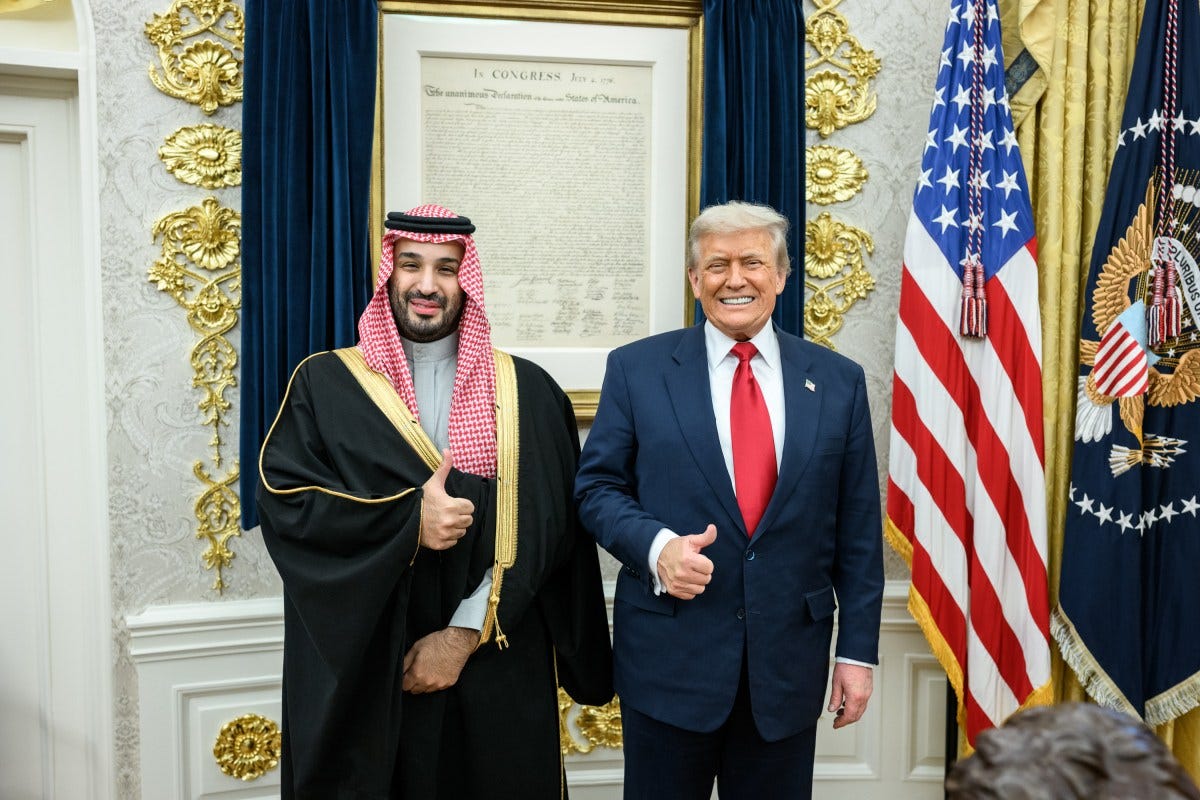The MBS White House visit makes one thing clear: Trump backs Vision 2030
The Saudi Arabian Crown Prince pledged nearly $1 trillion investment in the US over four years

On Tuesday, Saudi Arabia’s ambitious Crown Prince Mohammed bin Salman (MBS) visited the White House for a lavish welcome hosted by U.S. President Donald Trump.
The ceremony was grand: the red carpet was rolled out, fighter jets roared overhead, and U.S. soldiers rode on horseback carrying American and Saudi flags. Later, an extravagant dinner brought Saudi officials together with high-profile guests, including soccer star Christiano Ronaldo, now playing for Saudi’s Al-Nassr F.C.
The Crown Prince’s visit came at a critical moment. After strained relations under President Biden, who vowed to make Saudi Arabia a “pariah,” MBS sought to restore – and deepen – ties with Washington. This was his first U.S. visit in eight years, dating back to Trump’s first term.
Inside an Oval Office full of reporters asking questions, several topics were discussed by Trump and MBS. Among them were investments and technology.
Saudi Arabia plans to pour nearly $1 trillion into the U.S. over the next four years, particularly in artificial intelligence, semiconductors, nuclear energy and critical minerals – all central to the ambitious Vision 2030 plan. “We are going to increase that $600 billion” he said during the meeting, referring to a previous agreement, “to almost $1 trillion.”
So why does Saudi Arabia seek to invest that much money in the U.S.?
The answer lies in the Kingdom’s pragmatic push to move beyond its dependence on oil– nicknamed ‘black gold’ and expand its economic power in the region.
Oil was first discovered in Saudi Arabia in 1938, and over eight decades later, the Kingdom now holds the world’s second-largest reserves, accounting for roughly 25% of the world’s supply. More than 55% of the government’s revenue still comes from oil, the main resource that has powered the modern world.
But MBS said in a 2016 interview with Al Alaribya: “Oil is not beneath the ground; it is in its people.” Some could argue he was explaining that prosperity depends on humanity itself, instead of a reliance on oil.
That philosophy is the foundation of Vision 2030, a plan to diversify the Saudi economy, society and position the Kingdom as a global tech and investment hub.
In that same interview, however, he also said that Saudi Arabia has “a case of addiction to oil” and “It disrupted the development of many sectors in the past years.” Vision 2030 aims to break that dependence by “diversifying the economy, empowering citizens, creating a vibrant environment for both local and international investors,” according to the plan’s website.
And according to the government, the plan is 85% either complete or on track as of October 2025.
Social reforms implemented by MBS were once unthinkable, but have reshaped the country. Women were allowed to drive in 2018 and could travel abroad without male guardian approval in 2019. Women were more free to enjoy public life, with economic participation jumping from 18% in 2016 to 37% in 2022.
The entertainment sector – which had severe limitations – has boomed since 2018. Some of the largest sporting, music and comedy events happened in the Saudi capital of Riyadh and coastal city of Jeddah. Megaprojects such as NEOM, the planned $500 billion futuristic city, aims to host nine million residents and have zero carbon emissions, showcases the Kingdom’s ambitions.
Technology, however, is the centerpiece, with experts saying Riyadh could be called the “Mideast’s Silicon Valley.” Saudi Arabia announced in 2024 it plans to invest $40 billion in AI through its Public Investment Fund (PIF), including a $10 billion in Google’s cloud hub. And as late as June, Saudi Arabia announced the creation of its own AI company, HumAIn, and launched the first-ever Arabic chatbot in August.
Trump emphasized AI repeatedly during the Oval Office meeting. “The agreements we are signing today in many areas - in technology and AI, in rare materials, magnet, etc – that will create a lot of investment opportunities.” This was exactly what MBS came for in regards to Vision 2030: American support for the ambitious plan.
Which came in the form of chips.
On Wednesday, the U.S. officially approved the sales of 35,000 advanced Nvidia chips worth $1 billion to HumAIn, a huge victory for MBS after U.S.-Saudi relations turned sour for years under the Biden presidency.
Whether Saudi Arabia truly becomes the Middle East’s Silicon Valley is unclear. But he is set on making it happen with Trump’s support.

